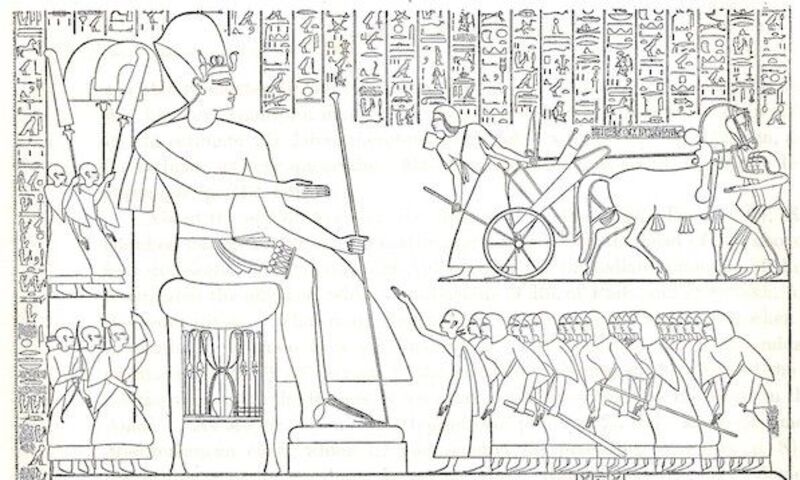When I was asked to contribute a chapter on warfare to a recent book looking at ancient Israel (The Ancient Israelite World), I decided to focus on one particular aspect of warfare in ancient Israel that has not been studied much before: intelligence gathering. Like many other areas of life, this topic is somewhat theologized in the Old Testament. You can read the entire paper (along with many other interesting articles!) in the book itself, though it is very expensive. But this blog will offer an overview of the article.
Military intelligence is an important part of warfare, but it has generally been under appreciated throughout history. This was particularly true for the ancient Near East, where kings focused more on their victories in battles than on their preparations for battle. I divide military intelligence into three categories. First, spying includes gathering strategic information about the enemy, generally away from the battlefield. This information may come from the foreign nationals or from a person who travels to or lives in the foreign state. Scouting includes gathering operational information for a campaign and tactical information near the battlefield. This kind of information largely comes from scouts who were sent out before battle to learn about the enemy and the surroundings of the battlefield. The third area of military intelligence is how ancient leaders sought guidance from these divine beings about their enemies through such means as divination.
The most extensive story about scouting in Egyptian records comes from Ramses II in his campaign against the Hittites at Qadesh. However, in this case Egyptian scouting failed when they did not notice the counter-espionage of the Hittites’ scouts. Two Shasu spies informed Ramses II that the Hittite king remained in Hatti instead of leading his troops into battle, but this was not true as the Hittite king was actually at Qadesh awaiting the pharaoh and had sent these spies to mislead the Egyptian king. Later, the Egyptian intelligence service partially redeemed itself when it captured two Hittite scouts, who revealed that the Hittite king was near. The picture at the top of this page is from a relief of this battle, showing the beating of these two Hittite scouts (the picture is a line drawing of a relief from the Ramesseum from James Henry Breasted, Battle of Kadesh (Chicago: The University of Chicago Press, 1903), pl. 1.).
The large number of Assyrian letters has allowed us a relatively clear picture of how strategic intelligence was gathered and analyzed in Assyria. The Assyrians often lived in foreign lands, providing many opportunities to learn about those areas. Like other armies, the Assyrians employed scouts before battle. Finally, several Assyrian kings employed divination as a way to learn about enemy troop movements.
The thoroughly religious cultures of the ancient Near East opened the door to an avenue that is not taken seriously today when it requested knowledge from the gods. Egypt exhibited knowledge of the outside world and worked to put tactical and operational intelligence into use in their campaigns. The Assyrians in particular seem to have mastered the art of not only gathering military intelligence but also analyzing it.
Israel provides a good test case of what the gathering of military intelligence looks like for a smaller kingdom: the acquisition of strategic information from foreign nations was much more limited, but many stories in the Hebrew Bible exhibit the importance attributed to tactical and operational intelligence. The time in the wilderness lays the foundation for the theme of scouting in the Hebrew Bible. YHWH was initially responsible for scouting ahead of the Israelites through the Ark of the Covenant (Num 10:33). When the Israelites drew near to Canaan, he commanded that the Israelites themselves scout out the land, perhaps as a kind of test. While they were able to gather important information about Canaan, they failed the test. The alarming parts of the report of the scouts led the people to rebel against YHWH’s entire project and threatened to undo all of YHWH’s previous redemptive acts (Numbers 13-14). Future scouting would always have this episode as a precedent: would learning more information about an enemy bring Israel to trust YHWH or rebel against him?
Like many other areas of warfare, the goal for Israel was never merely military success. The premier example of this was the law of the king that prohibited the king from accumulating a large army or making alliances with foreign nations through marriage (Deut 17:14–17). This text serves as the basis for condemning Solomon’s military expansionism. Likewise, YHWH commanded Joshua to burn the captured Canaanite chariots and hamstring captured horses rather than increase the size of their army with the captured armaments (Josh 11:6). I argue elsewhere the reason that YHWH never gave a divine weapon to an Israelite or Judean king, a common practice in the rest of the ancient Near East, is that such a weapon could encourage the king to trust in something besides YHWH. The texts about military intelligence fit into this pattern of placing far greater prominence on trust in YHWH than in their own strength or knowledge.
 Biola University
Biola University




